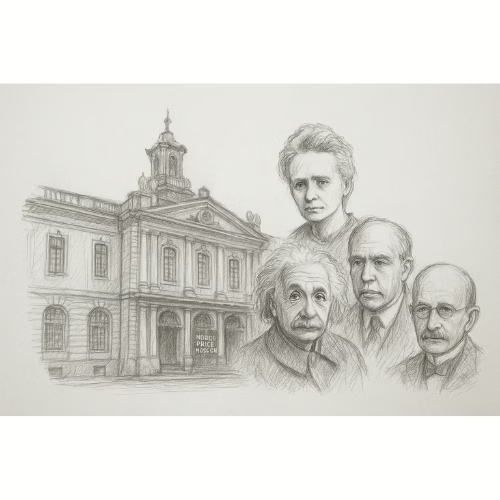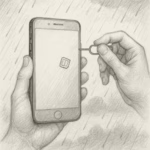In the center of Stockholm’s Old Town stands the Nobel Prize Museum—quiet, noble, restrained. I entered not with excitement but with something else, something older. A trembling in my chest that felt like a memory.
It took me back to a time I was barely more than a child—sick for a week, curled up in bed without the distractions kids have now. No phone. No games. Television was something that came on at 7 p.m., and only if the weather was kind. All I had were books, and I devoured them. I remember one clearly: the history of great physicists. Blaise Pascal and his reservoirs. The strange, quiet sorrow of Marie Curie and her poisoned brilliance. I didn’t understand everything—how could I? I was twelve. But their lives stayed with me like distant lighthouses. I wanted to be like them. I wanted to build something for humanity, to devote my life to something bigger than myself.
Eventually, I made it into university, into physics, where those same names hung like constellations over every blackboard. But then I learned what the textbooks never said.
There were theories—magnificent ones—born from the minds of Russian scientists. And yet, when it came time to award the Nobel Prize, it was others who received it. My professor explained, almost casually, that this had nothing to do with science. It was politics. Sweden and the Soviet Union never did get along. Even a discovery couldn’t float if it came from the wrong side of history.
I thought about Lev Landau then, the man I once studied obsessively. Brilliant, mercurial, and eventually imprisoned under Stalin. A mind that rewrote the laws of matter, but still found himself locked in a cage. I wondered what he must have thought during those nights, if he ever felt—like I did—that science should have been above power. That truth should not need permission.
But then, academia taught me otherwise. In labs, in narrow corridors and long fluorescent-lit nights, I saw how brilliance was irrelevant unless someone endorsed it. I saw how the first name on the paper was often the one who wrote nothing. I saw how a recommendation letter mattered more than your data. I saw how you could work and sleep and dream in the same laboratory, only to be erased for daring to say something someone didn’t like. I was erased. My name was deleted. The paper was published without me. I complained. I filed. I sent documents, emails, and proof. They replied with polite regret and no action. It changed nothing.
I left, eventually. Not science, not exactly, but the system. And after that, I published two papers alone. Not for fame. Not for a job. Just to prove that I had existed. That I could still build something from the ruins.
Inside the museum, I stood among the names that had been awarded. Names that had survived the machine. And I thought of all the ones who hadn’t. Van Gogh, who sold nothing while he lived. Aleksis Kivi, who died before anyone cared he had written. The Nobel Museum doesn’t display names like ours. It’s too quiet for that kind of grief.
I thought of all the brilliant students whose English was broken, whose questions made no sense, who still returned home with glowing titles and glittering positions, while I—who had nothing but integrity—was left out in the cold. I thought of all the games I refused to play, all the small smiles I didn’t give to the right people, all the times I chose honesty and lost.
And I realized something: the system wasn’t broken. It was designed that way.
I walked through those halls like a ghost. My past behind glass cases, but no label. No applause.
The Nobel is for the ones who float. But some of us were always ships too heavy with truth.
The Vasa ship sank on her maiden voyage. Everyone knows that story now. They marvel at her woodwork, her cannons, her ambition. But they never ask who built her. Who warned she was too heavy. Who went down with her. She’s beautiful now, in death, because someone pulled her from the water and decided she mattered.
Maybe one day, they’ll pull people like me from the dark.
Maybe they won’t.
Either way, I’ve stopped waiting.
Not everything brilliant gets raised.
Not every wreck gets honored.
But some of us—
some of us are still down there, whole, in the quiet, waiting.
And we are still beautiful.



